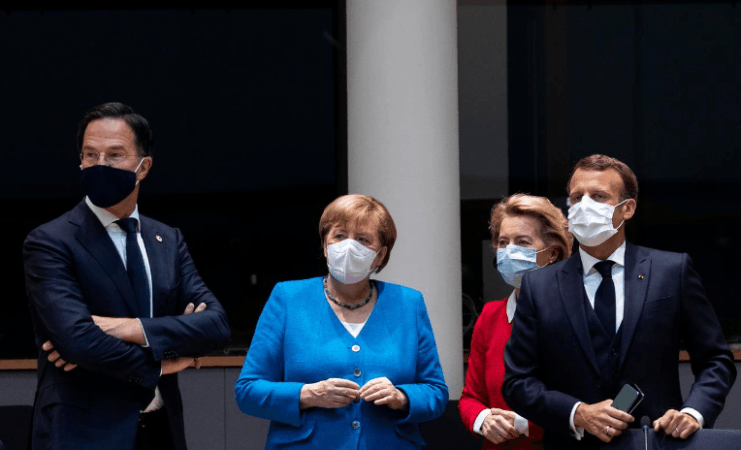
European Union leaders failed to agree on a massive stimulus fund to revive their coronavirus-hammered economies on Saturday after two days of fraught negotiations, but extended their summit for another day to try and overcome their differences.
As the 27 leaders scurried back to their hotels after a late, inconclusive dinner, German Chancellor Angela Merkel and French President Emmanuel Macron stayed behind in the EU's headquarters in Brussels to haggle with the Dutch-led camp of thrifty countries demanding cuts to the 1.8-trillion-euro package.
"The negotiations were heated," said Prime Minister Giuseppe Conte of Italy, one of the EU countries most affected by the coronavirus crisis that are seeking generous aid from the bloc. "Europe is under the blackmail of the 'frugals'."
"We have to do all what is possible to reach a deal tomorrow. Further delays are not useful to anybody."
Summit chairman Charles Michel was due to hand new proposals before the 27 reconvene at noon (1000 GMT) on Sunday.
Leaders locked horns over a proposed $856 bn recovery fund
With the pandemic dealing Europe its worst economic shock since World War Two, leaders first locked horns on Friday over a proposed 750 billion euro ($856 billion) recovery fund and a 2021-27 EU budget of more than 1 trillion euros.
But a group of wealthy and fiscally "frugal" northern states — the Netherlands, Austria, Denmark and Sweden — blocked progress in the first face-to-face EU summit since spring lockdowns across the continent.
They favour repayable loans rather than free grants for the hard-hit indebted economies mostly on the Mediterranean rim, and they want stricter control over how the funds are spent.
Hopes for an agreement grew earlier on Saturday when Michel proposed revisions to the overall package designed to assuage the Dutch concerns.
Under his new plan, the portion of grants in the recovery fund would be reduced to 450 billion euros from 500 billion and an 'emergency brake' on disbursement would be added.
But hopes that this would be enough faded quickly as Sweden asked for grants to be cut to 155 billion euros, according to diplomatic sources. Some pointed out the recovery scheme would risk being irrelevant at that much-reduced scale.
Conte also said a de-facto veto on national applications for aid sought by The Hague was "politically and legally improper and also largely unfeasible".
"HIGH TIME"
The budget commissioner of the bloc's executive reminded the leaders - who wore masks and kept their distance from each other - that COVID-19 was still among them and they needed to act.
"Just a solemn reminder: the Corona crisis is not over: infections on the rise in many countries," Johannes Hahn tweeted. "High time to reach an agreement which allows us to provide the urgently needed support for our citizens+economies!"
Diplomats said the "frugals" also pressed through the day for bigger rebates for net payers into the core EU budget, among other demands.
Other countries had their own demands in negotiations criss-crossing different regional and economic priorities, putting in doubt an unprecedented act of solidarity for the EU under which the executive European Commission would borrow billions of euros on capital markets on behalf of them all.
The exact size of the EU's long-term budget and how far to use payouts as leverage for reforms, or whether to withhold money from countries that fail to live up to democratic standards, were unresolved as the leaders left on Saturday.
Hungary, backed by its eurosceptic, nationalist ally Poland, has threatened to veto the whole package over a new envisaged mechanism to freeze out countries flouting democracy.
The EU is already grappling with the protracted saga of Britain's exit from the bloc and has been bruised by past crises, from the financial meltdown of 2008 to feuds over migration.
Another economic shock could expose it to more eurosceptic, nationalist and protectionist forces, and weaken its standing against China, the United States or Russia.

















